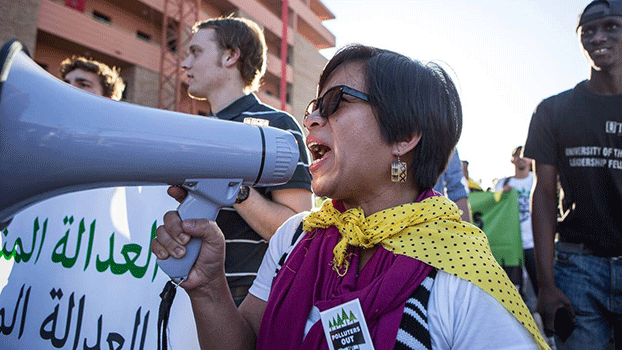
I honestly don’t know how I would feel whenever I am asked how long I have been ‘following’ the climate negotiations or how many COPs I have been to. Do I feel proud at being a ‘pro’, or do I feel embarrassed in this day and age of ‘flight shaming’ that my carbon footprint may have contributed to global warming with all the flights that I have taken to attend these high-level annual meetings where I am just an observer?
Tetet Lauron is based in the Philippines, where she works as an advisor for the Rosa-Luxemburg-Stiftung’s International Politics Unit.
I have been to far too many COPs that’s for sure (the next UN climate conference in Glasgow will actually be my 12th!), but yet I can’t say that I fully understand the complexities of international climate diplomacy. Or why I can’t reconcile all the nice speeches that world leaders make about the need to act on the climate emergency with the fact that after more than a quarter of a century of negotiations, climate change has become an even bigger problem today. But neither could I explain how my heart skips a beat whenever I see developing country negotiators fight so hard to push rich countries to own up to that fact that they have contributed the most to the climate problem through centuries of colonial legacy and the continuing reality of neo-liberal and unjust trade and investment agreements, and should therefore pay up for the massive destruction of lives and livelihoods especially in the global South.
Oh, how my heart has been broken many times over with the unambitious and unjust outcomes at the end of each COP, because I know that with each negotiation session that does not have outcomes that are truly aspirational and responsive to the gravity and urgency of the climate crisis, millions of lives and livelihoods especially in the global South are being put at an even greater risk in addition to our daily battle to live decent lives in the face of poverty, landlessness, joblessness and violations or our human rights. And how angry I am at how corporations are now heralded as ‘key’ to climate solutions when in fact it is their unrestrained profiteering through massive extraction of the world’s resources that has exploited and oppressed people that we are facing this great existential threat.
I have been part of many conversations among activists on the relevance and effectiveness of international diplomacy, of the United Nations, in solving the many challenges the world faces. On whether we are contributing to the continuing legitimization or the creation of the illusion of hope by ‘engaging’. That our energies could perhaps be better channeled organizing and mobilizing on the ground.
Civil society and social movements have adopted the dual tactics of an ‘inside-outside’ strategy (and I will use this rather simplistic explanation of the ‘inside’ as lobbying/advocacy for policy reforms, while the ‘outside’ could be in the form of mobilization, disruption and what could be classified as social movement activities). And I have consciously tried to avoid work in the ‘inside’, which I felt, was more for policy wonks and nerds.
I have come to realize that as Leftists, we should be able to broaden our understanding and appreciation of the struggle for transformative changes. That it is not a choice between inside or outside, but rather an issue of how Leftists are able to see how these two spaces are inextricably linked, and as such, advocacy and campaigning are both necessary and critical.
There is a need for advocacy in intergovernmental spaces because there is a practical need for reforms that communities facing the worst impacts of climate injustice are demanding – e.g. finance for adaptation, losses and damages. It is civil society’s responsibility to raise these issues of people on the ground – especially those who do not have access to these spaces. It is important that civil society watches closely, and to raise the bar on what we expect from world leaders because negotiations is akin to a game of compromises and horse-trading. Civil society fought hard to have a say in these spaces – our participation - as observers who may access documents, delegations and provide inputs and interventions – was not handed on a silver platter, and even more now as this limited space for policy influencing is fast closing, we should not lose out by default for there are others who will take up that space.
But we should also be clear that what the world leaders are going to produce in this exercise of climate diplomacy is going to completely burn the planet for so long as it is beholden to geo-political, economic and corporate interests. And we should be able to disclose this to the larger global community, in order that we become part of building powerful people’s movements and creating a world that is better, more equal and just.
People’s solutions to the climate crisis exist, and these are solutions that will also end global inequality. Climate change is ultimately about political economy, and so the answers should go beyond technical discussions on reducing parts per million or keeping global temperatures to a certain level. Climate justice is a holistic, intersectional and multidimensional struggle that enables us to imagine a better world for people and planet.
The United Nations is severely challenged to deliver on this, and continued failure to do so could render it irrelevant, as people will rise up and find hope elsewhere.